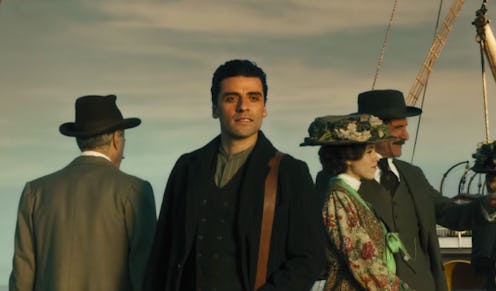
When a movie trailer boasts that it is "based on a true story," that can mean anything from loosely inspired by a family legend to a film so faithful to history, it's basically a reenactment. The Promise, the new romance set against the backdrop of the Armenian genocide, is somewhere in the middle. The Promise is based on a true story, in that the events that shape its narrative — the Ottoman Empire systematically persecuting and killing Armenians — did really happen. In fact, The Promise tackles the true story of the Armenian genocide — a story rarely seen on film — through the lens of a very untrue story of romance and jealousy.
On the surface, The Promise is a film about a romantic triangle: aspiring Armenian doctor Mikael (Oscar Isaac) falls in love with an Armenian woman Ana (Charlotte Le Bon) who is in a relationship with AP journalist Chris (Christian Bale). As the three develop a complicated friendship, the Armenian genocide begins, and the film follows them as they try to escape the reach of the Ottoman Empire. Mikael, Ana, and Chris didn't really exist. The love story in The Promise came completely from the minds of screenwriters Robin Swicord and Terry George (George also directed the film). But the war and the genocide is, unfortunately, very real.
The Armenian genocide depicted in The Promise occurred in modern-day Turkey starting in 1915, when rulers of the Ottoman Empire forcibly removed Armenian populations from their homes, leading to an estimated 1.5 million Armenian deaths. It's a historical event that has been largely absent from Hollywood (and, in some cases, history in general), in part due to the fact that modern day Turkish officials still deny the genocide occurred. (The U.S. has also yet to officially recognize the Armenian genocide.) It was this fact — that the Armenian genocide was not widely known or acknowledged — that inspired businessman Kirk Kerkorian to get into the filmmaking business, and led to the creation of The Promise.
The Promise was initially envisioned as a film that could dramatize the Armenian genocide and introduce it to wider audiences without becoming an after-school special. "We didn't want this to be a history lesson. We want people to be moved and lose themselves for a period of time in the movie," explained Kerkorian's business partner, and The Promise producer Eric Esrailian in an interview with The Daily Cal. Kerkorian financed The Promise completely, providing the entire $100 million budget out of his own pocket to ensure the film was made.
Balancing the real genocide with the fictional love story in The Promise wasn't easy for George. "There were so many elements to get into this — the love story, the conflict between these people and the political characters, and the scope of the genocide — so it was like putting together a jigsaw puzzle," the director said in an interview with The Hollywood Reporter. George hopes that the film's blending of fiction and nonfiction will result in a hopeful and true message for audiences everywhere. "The Armenians were killed by their own government, not by the enemy, and they were killed in this systematic way that became the legal definition of the word 'genocide,'" he told The Hollywood Reporter. "But this story says that a man or a woman, as small as they are in the scope of the world, can confront and overcome evil and survive and lead a better life for others to follow."
The Promise might not be 100 percent based on a true story, but that doesn't make the story any less relevant or important in conveying the true horrors of history.